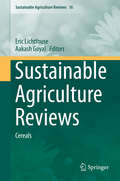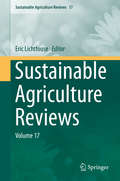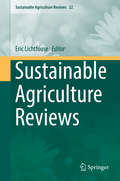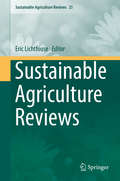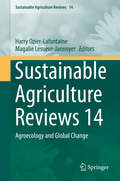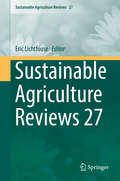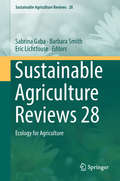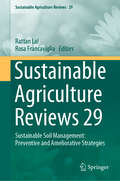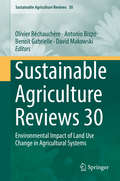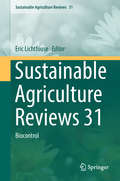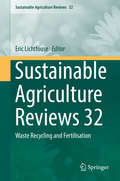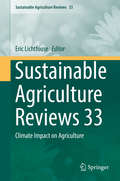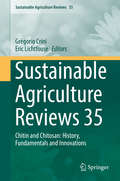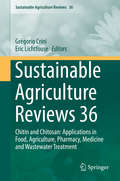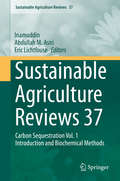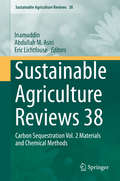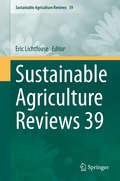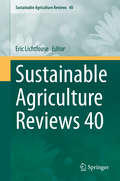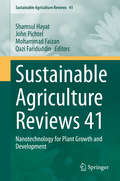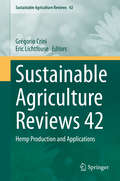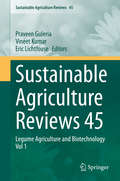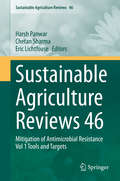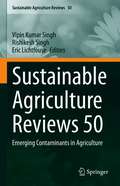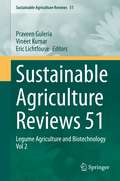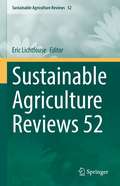- Table View
- List View
Sustainable Agriculture Reviews
by Eric Lichtfouse Aakash GoyalSustainable agriculture is a rapidly growing field aiming at producing food and energy in a sustainable way for humans and their children. Sustainable agriculture is a discipline that addresses current issues such as climate change, increasing food and fuel prices, poor-nation starvation, rich-nation obesity, water pollution, soil erosion, fertility loss, pest control, and biodiversity depletion. Novel, environmentally-friendly solutions are proposed based on integrated knowledge from sciences as diverse as agronomy, soil science, molecular biology, chemistry, toxicology, ecology, economy, and social sciences. Indeed, sustainable agriculture decipher mechanisms of processes that occur from the molecular level to the farming system to the global level at time scales ranging from seconds to centuries. For that, scientists use the system approach that involves studying components and interactions of a whole system to address scientific, economic and social issues. In that respect, sustainable agriculture is not a classical, narrow science. Instead of solving problems using the classical painkiller approach that treats only negative impacts, sustainable agriculture treats problem sources. Because most actual society issues are now intertwined, global, and fast-developing, sustainable agriculture will bring solutions to build a safer world.
Sustainable Agriculture Reviews
by Eric LichtfouseThis book features articles that analyze current agricultural issues and knowledge. It also proposes novel, environmentally friendly solutions that are based on integrated information from such fields as agronomy, soil science, molecular biology, chemistry, toxicology, ecology, economics and the social sciences. Coverage examines ways to produce food and energy in a sustainable way for humans and their children. Inside, readers will find articles that explore climate change, increasing food and fuel prices, poor-nation starvation, rich-nation obesity, water pollution, soil erosion, fertility loss, pest control and biodiversity depletion. Instead of solving problems using the classical painkiller approach, which seeks to limit negative impacts, sustainable agriculture treats challenges at their source. Because most societal issues are in fact intertwined, global, and fast-developing, sustainable agriculture will bring solutions that have the potential to build a more peaceful world. This book will help scientists, decision-makers, professors, farmers and politicians build safer agriculture, energy and food systems for future generations.
Sustainable Agriculture Reviews
by Eric LichtfouseThis book deals with a rapidly growing field aiming at producing food and energy in a sustainable way for humans and their children. It is a discipline that addresses current issues such as climate change, increasing food and fuel prices, poor-nation starvation, rich-nation obesity, water pollution, soil erosion, fertility loss, pest control, and biodiversity depletion. Novel, environmentally-friendly solutions are proposed based on integrated knowledge from sciences as diverse as agronomy, soil science, molecular biology, chemistry, toxicology, ecology, economy, and social sciences. Indeed, sustainable agriculture decipher mechanisms of processes that occur from the molecular level to the farming system to the global level at time scales ranging from seconds to centuries. For that, scientists use the system approach that involves studying components and interactions of a whole system to classical, narrow science. Instead of solving problems using the classical painkiller approach that treats only negative impacts, sustainable agriculture treats problem sources. Because most actual society issues are now intertwined, global, and fast developing, sustainable agriculture will bring solutions to build a safer world. this book series gathers review articles that analyze current agricultural issues and knowledge, then proposes alternative solutions. It will therefore help all scientists, decision makers, professors, farmers and politicians who wish to build a safe agriculture, energy and food system for future generations.
Sustainable Agriculture Reviews
by Eric LichtfouseThis book deals with a rapidly growing field aiming at producing food and energy in a sustainable way for humans and their children. It is a discipline that addresses current issues such as climate change, increasing food and fuel prices, poor-nation starvation, rich-nation obesity, water pollution, soil erosion, fertility loss, pest control, and biodiversity depletion. Novel, environmentally-friendly solutions are proposed based on integrated knowledge from sciences as diverse as agronomy, soil science, molecular biology, chemistry, toxicology, ecology, economy, and social sciences. Indeed, sustainable agriculture decipher mechanisms of processes that occur from the molecular level to the farming system to the global level at time scales ranging from seconds to centuries. For that, scientists use the system approach that involves studying components and interactions of a whole system to classical, narrow science. Instead of solving problems using the classical painkiller approach that treats only negative impacts, sustainable agriculture treats problem sources. Because most actual society issues are now intertwined, global, and fast developing, sustainable agriculture will bring solutions to build a safer world. this book series gathers review articles that analyze current agricultural issues and knowledge, then proposes alternative solutions. It will therefore help all scientists, decision makers, professors, farmers and politicians who wish to build a safe agriculture, energy and food system for future generations.
Sustainable Agriculture Reviews 14
by Harry Ozier-Lafontaine Magalie Lesueur-JannoyerSustainable agriculture is a rapidly growing field aiming at producing food and energy in a sustainable way for humans and their children. Sustainable agriculture is a discipline that addresses current issues such as climate change, increasing food and fuel prices, poor-nation starvation, rich-nation obesity, water pollution, soil erosion, fertility loss, pest control, and biodiversity depletion. Novel, environmentally-friendly solutions are proposed based on integrated knowledge from sciences as diverse as agronomy, soil science, molecular biology, chemistry, toxicology, ecology, economy, and social sciences. Indeed, sustainable agriculture decipher mechanisms of processes that occur from the molecular level to the farming system to the global level at time scales ranging from seconds to centuries. For that, scientists use the system approach that involves studying components and interactions of a whole system to address scientific, economic and social issues. In that respect, sustainable agriculture is not a classical, narrow science. Instead of solving problems using the classical painkiller approach that treats only negative impacts, sustainable agriculture treats problem sources. Because most actual society issues are now intertwined, global, and fast-developing, sustainable agriculture will bring solutions to build a safer world.
Sustainable Agriculture Reviews 27 (Sustainable Agriculture Reviews #27)
by Eric LichtfouseThis book deals with a rapidly growing field aiming at producing food and energy in a sustainable way for humans and their children. It is a discipline that addresses current issues: climate change, increasing food and fuel prices, poor-nation starvation, rich-nation obesity, water pollution, soil erosion, fertility loss, pest control and biodiversity depletion. This series gathers review articles that analyze current agricultural issues and knowledge, then proposes alternative solutions.
Sustainable Agriculture Reviews 28: Ecology For Agriculture (Sustainable Agriculture Reviews #28)
by Barbara Smith Eric Lichtfouse Sabrina GabaThis book presents ecological principles and applications of managing biodiversity in agriculture to decrease pesticide use and produce safe food. Major topics include ecosystem services biological pest control, conservation agriculture, drought stress, and soil biodiversity, carbon and fertilisation.
Sustainable Agriculture Reviews 29: Sustainable Soil Management: Preventive and Ameliorative Strategies (Sustainable Agriculture Reviews #29)
by Rattan Lal Rosa FrancavigliaThis book addresses the threats that hamper the achievement of sustainable soil management: soil erosion by water and wind, soil organic carbon loss, nutrient imbalance, salinization, contamination, acidification, loss of soil biodiversity, surface sealing, compaction and water logging. The specific focus is on preventive and ameliorative strategies for sustainable soil management.
Sustainable Agriculture Reviews 30: Environmental Impact of Land Use Change in Agricultural Systems (Sustainable Agriculture Reviews #30)
by Olivier Réchauchère Antonio Bispo Benoît Gabrielle David MakowskiThe originality of this book is to review and characterize the current body of scientific publications that describe the complete causal sequence from reorganization of agricultural production to land use changes (LUC) and the resulting environmental impacts. The chapters examine both the range of territorial reorganizations leading to LUC and the range of associated environmental impacts considered in the literature, including GHG emissions, atmospheric pollution, biodiversity impacts, water resources, and soil quality.
Sustainable Agriculture Reviews 31: Biocontrol (Sustainable Agriculture Reviews #31)
by Eric LichtfouseThis book presents advanced ecological techniques for crop cultivation and the chapters are arranged into four sections, namely general aspects, weeds, fungi, worms and microbes. Biocontrol is an ecological method of controlling pests such as insects, mites, weeds and plant diseases using other organisms. This practice has been used for centuries. Biocontrol relies on predation, parasitism, herbivory, or other natural mechanisms. Natural enemies of insect pests, also known as biological control agents, include predators, parasitoids, pathogens, and competitors.
Sustainable Agriculture Reviews 32: Waste Recycling and Fertilisation (Sustainable Agriculture Reviews #32)
by Eric LichtfouseThis book summarise advanced knowledge and methods to recycle waste and fertilise soils in agriculture. In the near future, waste recycling will no longer be an option because natural resources become rare and costly, urbanisation is blooming and population is growing. In theory, most waste could be recycled. In practice, most waste is wasted. Remarkable aspects include the concepts of waste hierarchy eco-houses in smart cities, microbes and fungi for plant nutrition, and benefits of legume cultivation, biochar application and agropastoralism.
Sustainable Agriculture Reviews 33: Climate Impact on Agriculture (Sustainable Agriculture Reviews #33)
by Eric LichtfouseThis book presents advanced knowledge on the relationships between climate change and agriculture, and various adaptation techniques such as low tillage, salt-adapted beneficial microbes and closed systems. Climate change is unavoidable but adaptation is possible. Climate change and agriculture are interrelated processes, both of which take place on a global scale. Climate change affects agriculture through changes in average temperatures, rainfall and climate extremes; changes in pests and diseases; changes in atmospheric carbon dioxide; changes in the nutritional quality of some foods; and changes in sea level.
Sustainable Agriculture Reviews 35: Chitin and Chitosan: History, Fundamentals and Innovations (Sustainable Agriculture Reviews #35)
by Eric Lichtfouse Grégorio CriniThis book reviews recent research and applications of chitin and chitosan, as natural alternatives of fossil fuel products, in green chemistry, energy, biotechnology, bioprinting, medicine, water treatment, agriculture and food science. Chitin and chitosan products are polysaccharides derived from food waste of crustaceans and fungi, and thus are cheap, abundant, sustainable, non-toxic, recyclable and biocompatible.
Sustainable Agriculture Reviews 36: Chitin and Chitosan: Applications in Food, Agriculture, Pharmacy, Medicine and Wastewater Treatment (Sustainable Agriculture Reviews #36)
by Eric Lichtfouse Grégorio CriniThis book reviews recent research and applications of chitin and chitosan, as natural alternatives of fossil fuel products, in medicine and pharmacy, agriculture, food science and water treatment. Chitin and chitosan products are polysaccharides derived from food waste of crustaceans and fungi, and thus are cheap, abundant, sustainable, non-toxic, recyclable and biocompatible. Remarkable applications include food additives and preservation, packaging materials, biopesticides and fertilisers, drug delivery, tissue engineering, bioflocculation and dye removal.
Sustainable Agriculture Reviews 37: Carbon Sequestration Vol. 1 Introduction and Biochemical Methods (Sustainable Agriculture Reviews #37)
by Eric Lichtfouse Inamuddin Abdullah M. AsiriThis book presents sources of carbon dioxide emission, related environmental issues and methods for carbon dioxide utilization, storage, analysis, modeling and optimization. This first volume focused on biochemical methods of carbon dioxide sequestration such as forestry, biomineralization, geo-chemo-mechanical, mangrove plantation and biowaste.
Sustainable Agriculture Reviews 38: Carbon Sequestration Vol. 2 Materials and Chemical Methods (Sustainable Agriculture Reviews #38)
by Eric Lichtfouse Inamuddin Abdullah M. AsiriThis book presents materials and physical methods for carbon dioxide sequestration. Materials include nanosponges, titanium oxide/zeolite hybrids, classical absorbents, metal oxides, ionic liquids, alkaline soils and metal organic frameworks. Methods include cryogenic capture, adsorption, solvent dissolution and soil sequestration.
Sustainable Agriculture Reviews 39 (Sustainable Agriculture Reviews #39)
by Eric LichtfouseThis book reviews recent research advances in sustainable agriculture, with focus on crop production, biodiversity and biofuels in Africa and Asia.
Sustainable Agriculture Reviews 40 (Sustainable Agriculture Reviews #40)
by Eric LichtfouseThis book reviews recent research advances in sustainable agriculture, with focus on crop production, biodiversity and biofuels in Africa and Asia.
Sustainable Agriculture Reviews 41: Nanotechnology for Plant Growth and Development (Sustainable Agriculture Reviews #41)
by John Pichtel Shamsul Hayat Mohammad Faizan Qazi FariduddinThis book presents recent developments involving the role of nanoparticles on plant physiology and growth. Nanotechnology applications include improvement of agricultural production using bio-conjugated NPs (encapsulation), transfer of DNA in plants for development of insect pest-resistant varieties, nanoformulations of agrochemicals such as pesticides and fertilizers for crop improvement, and nanosensors/nanobiosensors in crop protection for identification of diseases and residues of agrochemicals. Recent findings on the increased use of nanotechnology in agriculture by densely populated countries such as China and India indicate that this technology may impart a substantial impact on reducing hunger, malnutrition, and child mortality.
Sustainable Agriculture Reviews 42: Hemp Production and Applications (Sustainable Agriculture Reviews #42)
by Eric Lichtfouse Grégorio CriniThis book reviews recent research and applications, developments, research trends, methods and issues related to the applications of industrial hemp for fundamental research and technology.
Sustainable Agriculture Reviews 45: Legume Agriculture and Biotechnology Vol 1 (Sustainable Agriculture Reviews #45)
by Eric Lichtfouse Vineet Kumar Praveen GuleriaLegumes are a major constituent of vegetarian diets and alleviate malnutrition because they are protein-rich and easily digestible. Moreover, a legume-based diet is much more sustainable than a meat-based diet. Recent research has disclosed major advances in legume agriculture and biotechnology, leading to improved health benefits from nutrients, antioxidants, polyphenolic phytochemicals, phenolic acids, flavonoids and tannins. This book reviews bioactive compounds and their applications, and conventional breeding and biotechnology for legume sustainability and nutritional enhancement.
Sustainable Agriculture Reviews 46: Mitigation of Antimicrobial Resistance Vol 1 Tools and Targets (Sustainable Agriculture Reviews #46)
by Eric Lichtfouse Chetan Sharma Harsh PanwarAccording to the World Health Organization, antimicrobial resistance is a major threat to global health because the number of alternative antibiotics is very limited. Antimicrobial resistance is a slow evolutionary process that has been accelerated by human activities in health, environment and agriculture sectors. Due to their wide application, antibiotics and their residues have been found in almost all food products and natural ecosystems. This book reviews the drivers, impact and mitigation of antimicrobial resistance, with focus on methods and targets.
Sustainable Agriculture Reviews 50: Emerging Contaminants in Agriculture (Sustainable Agriculture Reviews #50)
by Eric Lichtfouse Rishikesh Singh Vipin Kumar SinghThis book reviews contaminants of emerging nature affecting the agroecosystem and includes important information regarding the their sources, types, transportation, environmental threats and strategies to decontaminate the affected agroecosystems. The contents of this volume will help the policy makers and environmental engineers in combating the continuously rising threats to cultivated ecosystems.
Sustainable Agriculture Reviews 51: Legume Agriculture and Biotechnology Vol 2 (Sustainable Agriculture Reviews #51)
by Eric Lichtfouse Vineet Kumar Praveen GuleriaIn the context of climate change, pollution and food safety, the current challenge is to enhance legumes production to sustain the growing population needs by 2050. This is a daunting task because abiotic and biotic stresses are threatening the growth, survival and productivity of legumes. For instance, the productivity of legumes is documented to be reduced by 14-88% by abiotic stresses. The co-occurrence of abiotic and biotic stresses under field conditions leads to interactive stress types, thus yielding positive or negative outcomes. Legumes react using antioxidant defense, osmoregulatory adjustments, hormonal regulations and molecular mechanisms to tolerate stress. Hence, improving legume productivity requires knowledge on the sensitivity, mechanisms and approaches of stress tolerance in legumes, in order to design new crops and alternative management systems. This book presents advances on bioactive compounds, applications, effect of various stresses and biotechnology-based stress tolerance mechanisms of legumes. This is our second volume on Legume Agriculture and Biotechnology, published in the series Sustainable Agriculture Reviews.
Sustainable Agriculture Reviews 52 (Sustainable Agriculture Reviews #52)
by Eric LichtfouseThis book presents advanced knowledge and techniques to improve food quality, such as organic farming, fertilization using waste, reducing arsenic in food, soil restoration, forage production in arid regions and weed control. Agriculture is actually facing two major challenges, feeding an ever-growing population and providing safe food in the context of pollution, climate change and the future circular economy.
